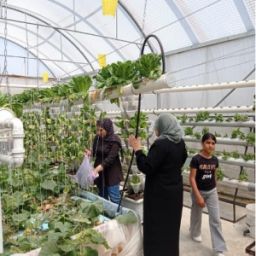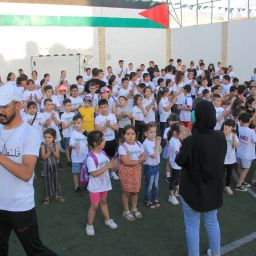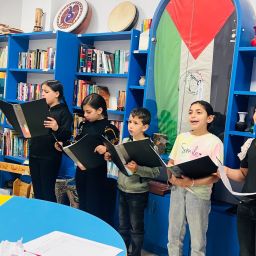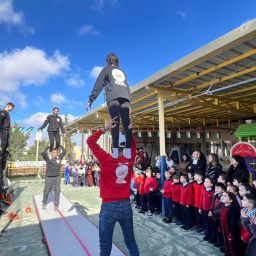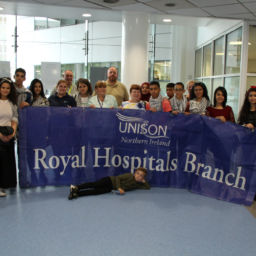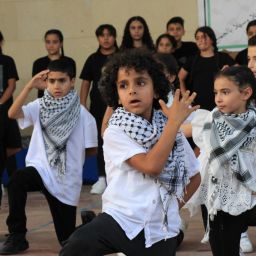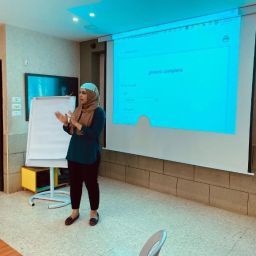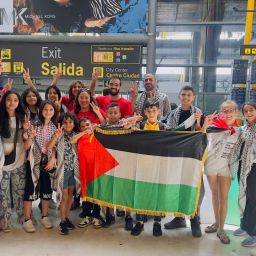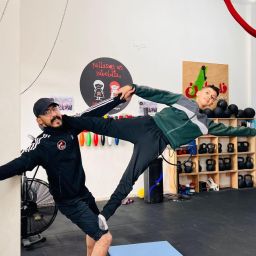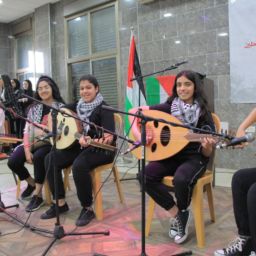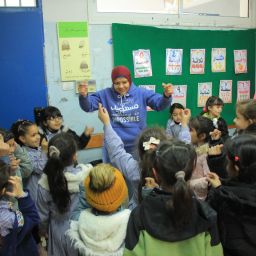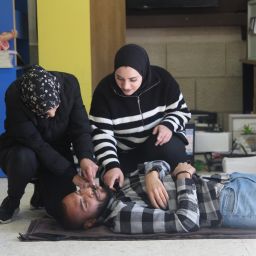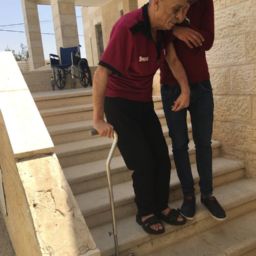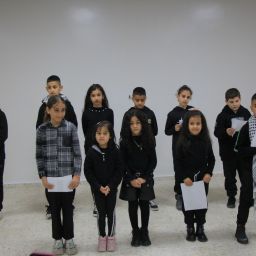In Palestine, February has always been the month of the poppy anemone flower. Many poems have linked the poppy flower to Palestinian martyrs, and this is what we are currently experiencing in Palestine during this time.
For the past 75 years, we have consistently lived through this situation. Every day, we witness one or two martyrs, yet we never become accustomed to it. Instead, with each Palestinian martyr, we grow stronger in our resolve to resist this regime through our minds, blood, education, teaching, and empowering our community. However, this February in Palestine, we have over 30,000 poppy flowers, with 70% being children and women. Additionally, more than 70,000 individuals are injured with limited to no aid. Over one million Palestinians are homeless, lacking secure places to live. Despite this, the international community remains largely silent about the situation in Palestine, with only individual actions from the international world aiming to stop the bloodshed in Gaza.
Last month, we began to place some faith in the concept of international justice that colonial regimes worldwide have long touted. However, we were confronted with the harsh reality of the international stage, witnessing the double standards concerning Palestine and Palestinians. There seems to be no justice for Palestinians, despite the glaring evidence of the apartheid colonial regime’s actions throughout Palestine. Despite this, no concrete actions are taken to address the situation or accurately label it as it should be: a genocide, ethnic cleansing, and colonial apartheid regime rather than mere occupation. There is a pressing need to call for a ceasefire in Gaza, deliver humanitarian aid to the people there, halt attacks on hospitals in Palestine, prevent colonizers from assaulting Palestinians in their homes at night, and cease the colonial regime’s annexation of Palestinian lands for the construction of settlements and roads.
Since the beginning of this year, numerous homes have been confiscated from Palestinians in Hussan village to construct the apartheid wall in the surrounding area. In Al-Waljeh village, three homes were demolished to make way for settlement colonies near the Bethlehem area. Over 13,000 Palestinians languish in prisons, lacking adequate food, water, clothing, blankets, and medical attention. Four Palestinian prisoners lost their lives this month due to oppressive policies and collective punishment. Majd Sabar, 21 years old from Hebron, died in colonial apartheid prisons after being denied medical treatment for his illness. Khaled Al Shawish, 53 years old, paralyzed since 2007, passed away, yearning for freedom beyond the confines of apartheid walls and rules. Aizz El Deen Al Bana, arrested during war despite physical disabilities, succumbed to complications arising from medical neglect. Asef Al Refaai, diagnosed with cancer during imprisonment, died despite international campaigns for his release. These individuals, along with many others, are more than mere numbers; they represent lives lost in the struggle for Palestinian rights. We refuse to relent in our quest for justice and freedom. We implore the international community to cease its double standards and truly uphold democratic values. We will continue to resist and strive for our aspirations—a free Palestine from the river to the sea.
Lajee Library
After a prolonged hiatus in Lajee Centre’s library activities, we have initiated a new strategy focusing on engaging children and youths in reading and writing skills development. We have formed six groups comprising children aged 4 to 17, working with each group in small settings to encourage literacy. Additionally, our efforts extend to educating children about Palestine and Palestinian rights.
We have commenced a project titled “My Homeland Palestine” for children aged 6 to 17, involving activities such as techno-travel to learn about Palestinian cities and workshops on drawing the Palestinian map and familiarizing them with cities, refugee camps, and their homelands. Furthermore, we have established collaboration with UN schools in Aida Camp, including school visits and activities with the students.
Throughout this month, we conducted 21 meetings with various groups, each with its own specific objectives. For children aged 4 to 5, we focused on reading stories to enhance analytical, memory, and drawing skills. For children aged 6 to 17, we initiated a reading club to deepen their understanding of Palestine and facilitate discussions. Moreover, we engaged children aged 13 to 17 in discussions on the poetry of Nasser Abu Srour, a Palestinian prisoner since 1993, providing insight into life inside the prison.
ACLAI Palestine
Since the beginning of this year, we have embarked on the initiative of establishing a community gym with the objective of involving participants in community activities. To achieve this, we focused on organizing social events for female participants to facilitate self-expression, alleviate life stressors, and enhance women’s skills. In February, we hosted four events for female participants at the Lajee center. These events included meetings with the women’s unit, where 17 women were introduced to various projects and initiatives undertaken by the unit. On February 20th, we held an event with the environmental unit, introducing women to hydroponic units and recycling methods for plastic bottles. Additionally, we organized two open days for women on the rooftop of the Lajee center, featuring healthy food and interactive activities.
Furthermore, we formed new groups for men participating in regular gym sessions and established a back pain training program for men in Aida and Al-Azza refugee camps. Additionally, a new group was created for men with physical disabilities at the gym.
Throughout the month, we recorded a total of 403 visits to the gym from both female and male participants.
Lajee-Celtic
After a long hiatus in training due to the genocidal war, the Lajee Celtic football academy has resumed its activities for youths and children. It has been, and continues to be, challenging to reintegrate children onto the football field, which is surrounded by the apartheid wall and watch towers, and still bears traces of tear gas. Whenever the children come into contact with the ground, they experience the effects of tear gas on their hands. Moreover, night attacks with tear gas bombs continue without any justification.
During this month, we conducted 7 training sessions for the academy, including 4 for youths aged 13-16 and 3 for children aged 5-12. Additionally, we endeavored to involve academy members in activities at the Lajee center, particularly library activities, and successfully engaged 16 youths from Lajee-Celtic in the fitness training program at the ACLAI Palestine gym.
Health and Environment Unit
- During this month, community health workers visited patients suffering from chronic diseases (hypertension and diabetes) a total of 150 times. The number of patients reached 125, residing in Aida and Al-Azza refugee camps.
- During these home visits, health workers conducted blood pressure and blood sugar checks, emphasizing the importance of taking medications at the correct doses and times according to the plan developed with the assistance of doctors Henry and Mohammad. They followed up regularly, listened attentively to patients, and extended the duration of visits, sometimes lasting an hour or more, especially considering the challenging circumstances that have affected patients psychologically, emotionally, socially, and economically. They continued to visit patients who had previously experienced health setbacks and intensively monitored their conditions, occasionally adjusting their medications and developing programs to improve their health status.
- Emergency visits were conducted for several patients this month, and communication was maintained with Dr. Mohammad Abu Srour to devise appropriate treatment plans by prescribing suitable medications.
- Two visits were made to each Level 2 and Level 1 patient with hypertension and diabetes, and one visit was made to Level 3 patients during this month. Efforts were made to control their conditions by providing necessary medications, adjusting their diet, and encouraging them to engage in physical activity. These visits aimed not only to monitor their health but also to provide psychological support to patients alongside health monitoring.
- Arranging weekly activities with the children of Zahrat Al-Yasmin Kindergarten including health-related activities such as healthy and unhealthy foods, personal hygiene using educational tools, and environmental activities involving the reuse of spoons and hanging geometric shapes and numbers on them. Additionally, plastic bottles are reused to create a ball made of paper, which is then used to play bowling. The aim is to convey the concept of plastic and paper reuse, waste reduction, and how to deal with them, with these crafts being showcased to the students’ parents during the graduation ceremony.
- Organizing environmental and health activities at Aida Girls’ Elementary School including explanations about first aid for the eighth grade and teaching girls how to separate waste such as plastic, food scraps, and non-reusable waste by collecting them from the school to be reused. Plastic is reused, and food scraps are used to produce organic fertilizers to help crop production at the school.
- Harvesting green leafy vegetables such as Swiss chard, lettuce, mustard greens, parsley, onions, mint, cabbage, and distributing them to patients.
- Cultivating hydroponic systems in plastic greenhouses with various crops such as radishes, cauliflower, arugula, and spinach.
- Weekly environmental activities with the Environmental Club students, including reusing plastic bottles for agriculture and hanging them on the center’s rooftop, as well as reusing paper and balloon wrappers to create a game.
- Distribution of 30 hydroponic towers to 30 female patients enrolled in the Health and Environment program at Lajee Center including all contents such as stones, small trays, large trays, water distribution pipes, metal pipes for water delivery from bottom to top, electric pumps, and plastic bases. After presenting a lecture to the patients explaining the reason for distributing these towers and their relationship to food sovereignty, along with providing instructions and tips, the patients were given appointments to assist them in installing the towers in their homes correctly and safely. The installation of a group of towers began this month in patients’ homes, along with planting various seedlings such as lettuce, parsley, and mint.
Rebel Circus School
- Continuation of circus training for students on Fridays, Saturdays, and Sundays, with each session lasting an hour and a half. Each session accommodates ten students.
- Current circus school training focuses on fostering team spirit and collaborative training with all students.
- A recreational sports activity was organized for first grade students from Aida Boys’ School at Lajee’s playground.
- Coordination with UNRWA schools in the camp: Coordination was made with the girls’ school to welcome new students who wish to enroll in the circus school.
Women’s Unit
The Women’s Unit organized five meetings during the month:
- On February 4th, an embroidery workshop was held with the attendance of six women. During this session, the women were trained on embroidery techniques.
- On February 6th, an introductory meeting for the Women’s Unit was held with the attendance of twelve women of various ages. The session focused on introducing the Women’s Unit, its goals, and projects.
- On February 18th, an embroidery workshop was conducted in collaboration with the Health and Environment Unit. Many embroideries were made, to be finalized by one of the women in the unit. Twenty women attended this session.
- On February 22nd, a meeting for the Women’s Unit was held with the attendance of seven women. This session involved preparing a Palestinian cookbook, where recipes were discussed and suggested by the women to be organized and prepared later for the book.
- On February 29th, a meeting for the Women’s Unit was held with the attendance of ten women, focusing on finalizing the preparation for the Palestinian cookbook, including the recipes suggested by the women in the unit.
Lajee Music Institute
- A workshop on musical instruments (oud/percussion/violin/qanoun) was conducted for third-grade students (sections A+B) at Aida Girls’ School. There was interaction among the students to learn more about these instruments, and at the end of the presentation, simple instruments were distributed to them, and they sang along with the music rhythms.
- On February 11th: The second group of Takht Ensemble recorded the song “Foq El-Nakhal” at the roof of Lajee Center.
- On February 17th: A musical and vocal workshop was held for Lajee Center students. The students recorded a song supporting the children of Gaza.
Dabka (Folklore Dance)
The Dabka Groups continued their trainings at Lajee Center with Mr. Sameh.
Students of the Zahrat Al-Yasmeen Kindergarten have weekly dabka trainings with Ms. Samah.
Zahrat al-Yasmeen Kindergarten
- On February 28th: The Occupational Therapy students from Bethlehem University led activities at Zahrat Al Yasmeen Kindergarten. There were 7 dedicated areas within the kindergarten classrooms and the Kindergarteners were divided into 6 groups so that each therapist could facilitate the process of moving from one activity to another with the children with ease. The goal of these activities was to release fear, anger and stress the children have experienced due to the war and the surrounding political conditions in the children’s environment, including the increased aggression and restrictions due to the occupation, military daily and nightly raids, and the economic conditions. To create an atmosphere of joy and happiness despite the grim reality.
- My House in a Picture Activity: The children were asked to speak about their homes in details, including address and location, describe what their homes are built of, and whether their home is a multi-story house (with extended family living in the same building) or an independent one (living with parents and siblings only). The children and teachers also discussed Palestinian homes before and after displacement and living in refugee camps.
- My Grandmother’s Story Activity – life and home before and after displacement: Zahrat Al Yasmeen invited one of the children’s grandmothers from Aida Refugee Camp who lived through the Nakba and was displaced from her village before residing in the refugee camp.
- Activities with other units of the Lajee Center included Library Activities and Health and Environmental Activities.
Balata Camp’s Health Unit
Work began with 37 new cases at the beginning of the current year, bringing the total number of patients in the program to 93. The patients are distributed geographically throughout all areas of Balata camp and range in age from 23 to 92 years old.
It is worth mentioning that the team achieved a great accomplishment during the second month of the year because the team was awaiting the results of laboratory tests for the comprehensive and cumulative examination from the agency’s clinic for the previous year, comparing them with the results of the current year.
Based on this, blood samples were taken from 9 patients over two days on the 5th and 6th of February, and the samples were sent to the agency’s laboratory in coordination with the agency’s clinic, with the results being revealed directly without waiting for months as with other patients.
On February 11th, the team organized an activity where 33 women participated in a recreational and stress-relieving activity in collaboration with the Miftah Foundation. During the activity, the women expressed the difficulties of life amidst the ongoing incursions on the camp and how it affects their well-being. They also discussed how this security situation contributes to increased readings of diabetes or hypertension in some individuals. Therefore, it was important for the team to conduct such activities that contribute to alleviating stress and tension among women.
Additionally, a health workshop was held with eighth and ninth-grade students in UNRWA schools, where the team discussed various female-related issues such as health matters, hygiene, and others.


